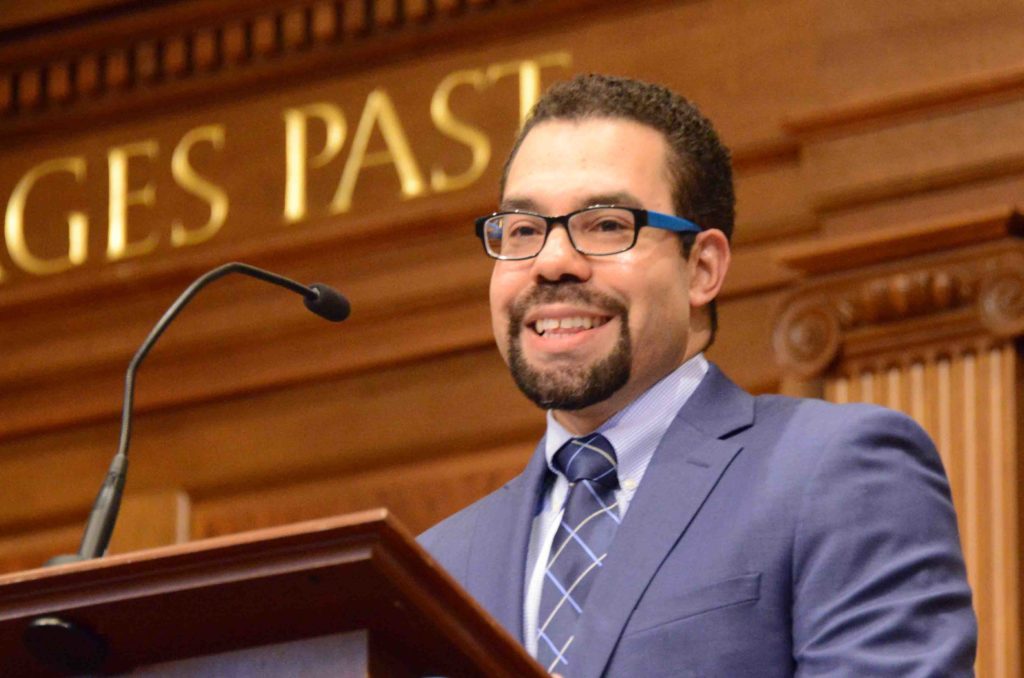Dr. Brian Purnell Is This Year’s Smith Visiting Scholar
On January 20, Dr. Brian Purnell delivered one of two Halls that he will give this year, as Roxbury Latin’s 2021-2022 Smith Visiting Scholar. “Most of you will remember Dr. Purnell from his riveting and impassioned Zoom-Hall last February titled ‘The Fierce Urgency of Now’ which explored his personal journey with Civil Rights Movement history,” Headmaster Brennan introduced. “We were so enamored of Dr. Purnell and his work that we invited him to join us for an entire semester, as our Smith Scholar, to teach an elective titled History of the Civil Rights Movement. We are grateful that he took us up on our invitation. Those of you who will have him as your teacher this winter and spring can expect an enlightening and meaningful exploration.”
Dr. Purnell’s Hall address on Thursday was titled “Education of a Patriot,” and through it he described his own experiences of growing up in an immigrant, military family; how he always imagined he would go into military service—a dream defeated by his asthma; and how his education—discovering the power of studying, understanding, and then teaching history—changed that trajectory for him, as he imagined other ways in which he could proudly serve and support his country.
“I began college feeling lost,” Dr. Purnell shared. “I was not the person I had thought I would be, and I didn’t see a way to become him. I didn’t know what to do. I floundered academically. Midway through my first semester, I was failing one class and barely passing another. I improved, but my grades were mediocre. History saved me. When I took required history and literature courses, I signed up for anything that said, “American.” And I loved it. I could spend hours reading about the United States. I thrived in class discussions. In military history courses, I studied about common soldiers, people like my father and uncle: the shoeless, frostbitten militiamen at Valley Forge; the runaway slaves who served in the Union Army; the Marines who raised the flag at Iwo Jima; the grunts and POWs in Vietnam. In Native American history, I learned about the horrors of colonialism. In African American and women’s history courses, I learned about painful contradictions in my nation’s past, but also its powerful promise of liberty and equity. I began thinking that being an historian could be a way to be a patriot.”
“Being a patriot does not come from a uniform, or self-righteousness, or martyrdom,” he concluded. “Devotion to one’s country is not only, or even best, measured in what you give up, but what you invest in; it does not come from what we tear down, but what we build up. America has a lot of problems, but we can solve them if we learn from our past mistakes, and work toward our future with intelligence, patience, and care… Patriotism does not belong to one political party, or one type of person. It doesn’t come from a uniform or a gun or anger or yelling or saying who we are against. It comes from saying what we are for. I hope you will live your patriotism in ways that make sense to you, and in ways that build up our country into a place that is just, equitable, and good. America’s future depends on those kinds of patriots.”
Read the entirety of Dr. Purnell’s Hall address “Education of a Patriot.”
Dr. Purnell is the Geoffrey Canada Professor of Africana Studies and History at Bowdoin College. His courses focus on topics of U.S. history, Africana studies, and urban studies. A life-long New Yorker, Dr. Purnell has focused much of his research, teaching, and writing on race relations—as well as related laws and urban development—throughout the boroughs of New York City. He has also taught and written extensively, however, about the place of racism in both the North and the South throughout our country’s history. Dr. Purnell earned his undergraduate degree from Fordham University and both his master’s and PhD in history from New York University.
Fifteen years ago, the late Robert Smith—RL Class of 1958—and his wife, Salua, established the Robert P. Smith International Fellowship so that Roxbury Latin could bring visiting scholars to campus each year, enhancing our curricula with their insightful perspectives on our increasingly complex world. Over the years, these scholars have educated us on such topics as economic globalization in Africa; modernization in China, India, and the Middle East; Latin American literature; the legacy of World War I; climate change and its far-reaching effects; borders, both physical and philosophical; and, most-recently, the nuances of race and gender, with Dr. Zine Magubane, professor of sociology at Boston College. We are grateful to Mr. and Mrs. Smith for their generosity and for enabling our greater understanding of these critical global issues.

